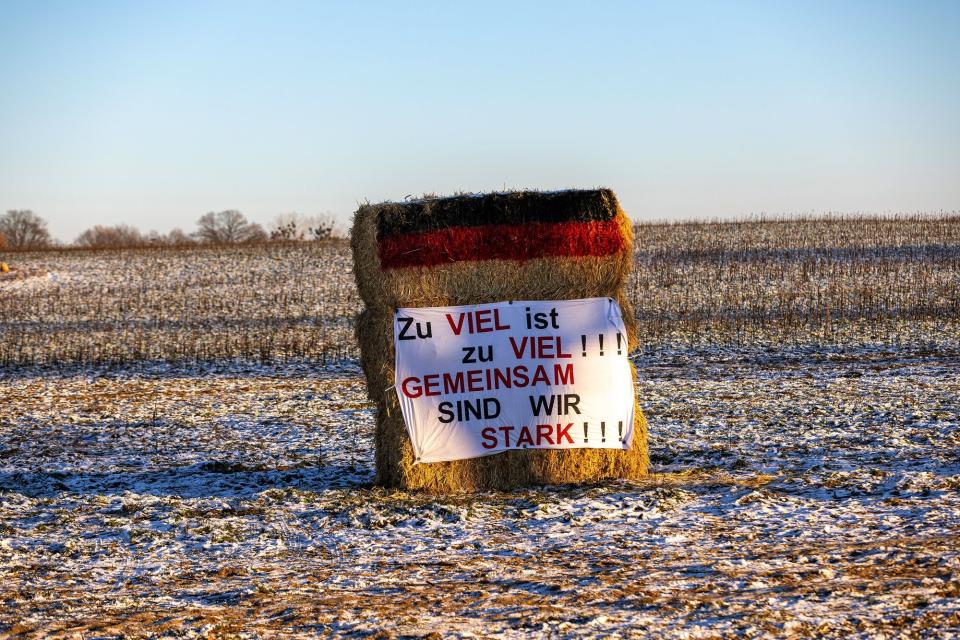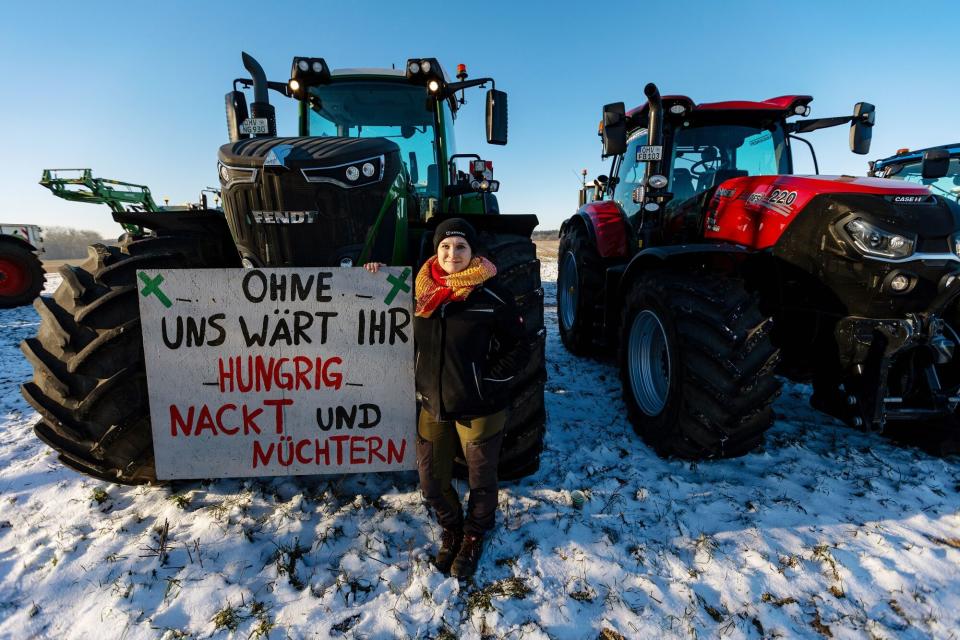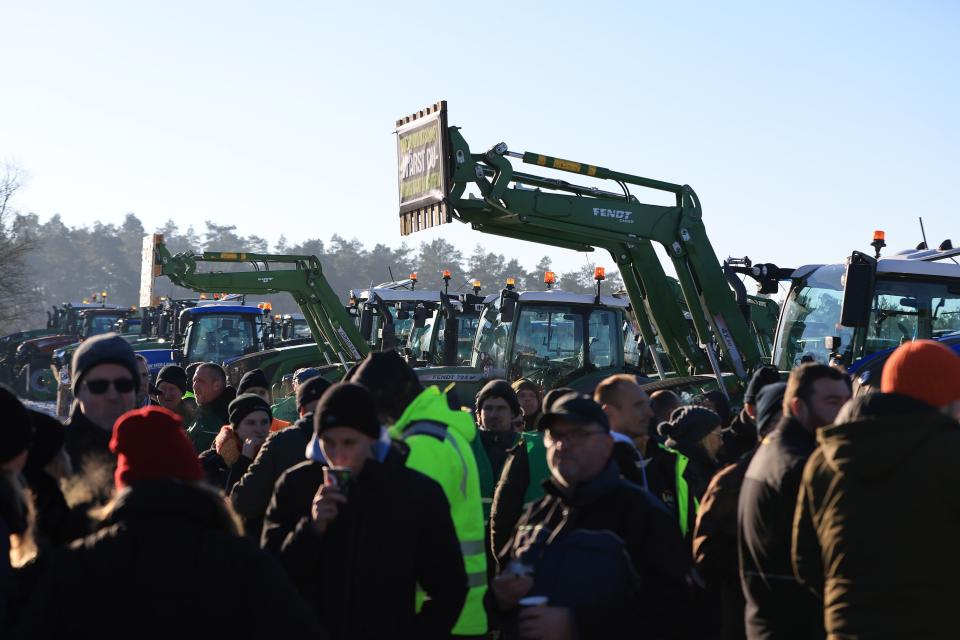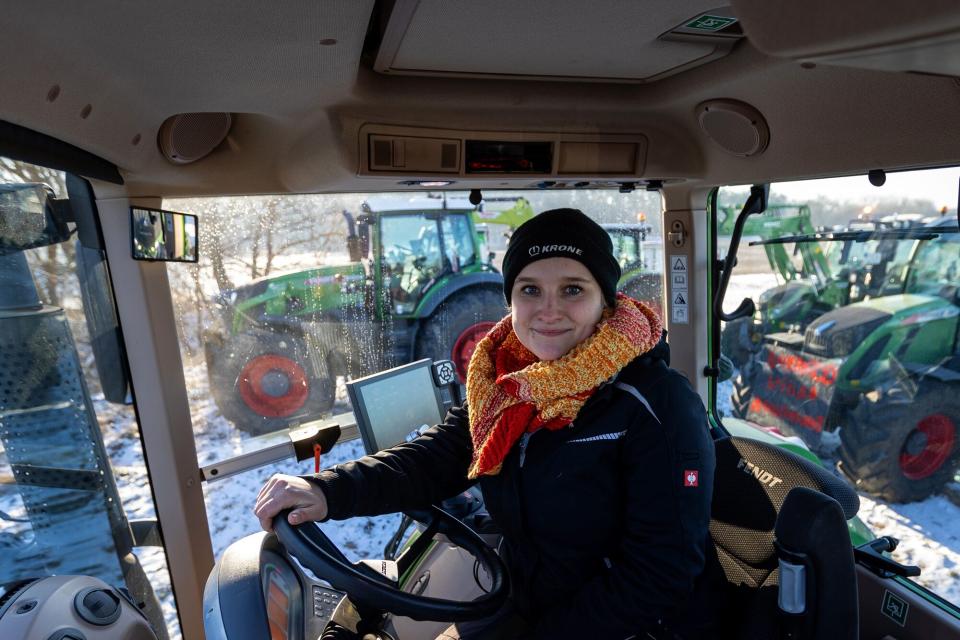Agrarians at the Gate Lead the Revolt Against Olaf Scholz
- Oops!Something went wrong.Please try again later.
(Bloomberg) -- At 5 a.m. on Monday, Cynthia Frey will climb into her 300-horsepower tractor and drive through the dark to the center of Berlin. There she’ll join hundreds of other farmers at the Brandenburg Gate and call for Chancellor Olaf Scholz to resign.
Most Read from Bloomberg
US Economy Set for Another Cash Boost If Congress Backs Tax Deal
Stocks Slip as Officials Push Back on Easing Bets: Markets Wrap
Apple to Pull Blood-Oxygen Tool From Watches to Avoid US Ban If Appeal Fails
“Without us, you would be hungry, naked and sober” reads a sign the 26-year-old single mother has prepared for the demonstration.
For a week, German farmers have blocked highways all over the country. But far from attracting resentment, they’re finding nationwide support for their protests. What emerged from opposition to the threat of subsidy cuts in agriculture has quickly morphed into an outlet for rage against Scholz’s three-party government — whose approval ratings are at an all-time low. About three out of four German voters are unhappy both with Scholz as leader and the entire government, according to a poll by research institute INSA published by Bild am Sonntag.
“The planned cuts to agriculture diesel subsidies were just the straw that broke the camel’s back,” Frey said at a protest in the town of Meseberg on Thursday. She stood in front of an enormous Fendt 930 tractor whose engine she kept running.
These protests are a noisiest manifestation yet of a culture-war realignment that’s shaken up old alliances in places like the US but which had been relatively absent from Europe’s largest economy.
On the same day that Frey makes the 70km (43 mile) ride to Berlin, Germany will release GDP numbers that are likely to show that the economy contracted last year. The irony for the farmers at the vanguard of these protests is that, by contrast with the broader economy, they’ve rarely had it so good.
They’re railing against a subsidy cut to the diesel that tractors like Frey’s consume at around 14 liters (4 gallons) an hour. But the impact that would have on farm budgets — about 3,000 euros ($3,300) per farm, according to Sebastian Lakner, an agriculture economist at the University of Rostock — is dwarfed by bumper profits on the back of the prices they now command for many of their products.
The farmers say they’re spurred less by economic motivations than a sense they’re being maligned and ignored.
Long perceived as an anchor of European stability, since Scholz’s election in 2021 Germany increasingly appears to be a country divided. Its government is now mired in squabbling about the budget just as political extremes are on the rise.
Earlier in the week the country was shaken by a news report about a meeting between neo-Nazis and members of the far-right AfD, who discussed plans for the mass deportation of migrants. The AfD are nevertheless second in polls. And two days previously an eponymous new party was founded on the far-left under the leadership of lawmaker Sahra Wagenknecht.
Read more: Germany’s New Far-Left Party Targets Voters Angry With Scholz
But it’s not just those at the fringes calling the administration out of touch. When the federal government decided to claw back budget from the agricultural sector, “there was no attempt to discuss this with farmers beforehand,” said Lower Saxony State Premier Stephan Weil, a member of Scholz’s Social Democrats. “So the frustration runs much deeper.”
When Scholz visited a train-maintenance facility in the eastern German town of Cottbus on Thursday, he was greeted by protesting farmers and hundreds of tractors honking their horns. But he seemed characteristically unmoved by the protests and instead praised the success of Germany’s high-speed trains.
The fact the country’s train drivers were also on a three-day nationwide strike, Scholz addressed with an ironic remark. Train rides are at the moment “an exciting adventure,” he quipped.
After his speech Scholz met representatives of the local farmer lobby, but made clear once again his unwillingness to withdraw the planned subsidy cuts, according to his spokesman Steffen Hebestreit. His government had previously made concessions by dropping a plan to end certain tax breaks.
One of the reasons the farmers aren’t giving up is that they sense weakness from a government that’s experienced a tremendous loss of authority in recent months.
A recent poll for public broadcaster ARD showed that more than 80% of Germans are dissatisfied with their government. Scholz’s personal approval rating slipped by one point to 19%, the lowest for a German chancellor since the survey was first conducted in 1997. Vice Chancellor Robert Habeck from the Greens, who used to be the star of the cabinet, dropped six points to 24%.
The protesting farmers despise the Greens in particular, on account of a climate protection agenda which has led to onerous environmental regulations.
“In the past two years, the government has overloaded us with so much red tape that we can barely do our daily work anymore,” said Bernhard Schaal, a farmer in the Eifel region in the far west corner of Germany. “This comes from people in Berlin who have no clue what they are doing.”
Habeck experienced this anger in person when a group of farmers prevented him from disembarking a ferry earlier this month on the North Sea coast of his home state of Schleswig-Holstein. The Green politician later posted a video in which he said the protest had been hijacked by right-wing extremists and warned German democracy is in danger.
“There are calls circulating with fantasies of a political overthrow. Extremist groups are forming, ethnic nationalist symbols are openly displayed,” Habeck said in the eight-minute video.
But Habeck’s response only fueled further anger. Many farmers see it as proof that Scholz’s coalition partners don’t understand their problems. “It’s such a cheap move to put us in the bag with right-wing extremists just because we are not happy with this left-green government,” said Bjoern Heinemann, a 48-year-old potato farmer from the town of Liebenwalde, in an interview at the Thursday protests.
“This government is so far removed from the people and has no idea what’s happening on our fields.”
The AfD and other right-wing groups have indeed tried to join the protests. A few demonstrators have waved symbols like the black flag of the Landvolkbewegung, a farmers’ protest movement which was central to the rise of National Socialism in the late 1920s. More common are pictures of traffic lights — representing the three-party coalition — hanging from the gallows.
Speaking on his Saturday video podcast, Scholz thanked Joachim Rukwied, the president of the farmers’ association, “for clearly distancing himself from extremists.”
“Gallows are not arguments,” he said.
In former East Germany the AfD polls higher than in the rest of the country, and many fear they could profit from the unrest in state elections that are approaching this year.
The majority of protesting farmers aren’t extremists but rather a group that’s taken the brunt of recent economic changes, according to sociologist Rolf Heinze. “People in the countryside feel it directly when the gas prices are going up.”
The protesters are counting on radical changes like an overthrow of government which, Heinze says, are unlikely to be met. “My worry is that many will drive home frustrated,” he said.
Frey is clear that she won’t give up so easily. “We will not stop until this government is gone,” she said.
--With assistance from Michael Nienaber, Iain Rogers, Zoe Schneeweiss, Áine Quinn and Monica Raymunt.
(Updates with INSA poll results in third paragraph.)
Most Read from Bloomberg Businessweek
Trumponomics 2.0: What to Expect If Trump Wins the 2024 Election
Kim Kardashian’s Skims Isn’t the Only Celebrity Brand to Watch
US Is Weaponizing New Economic Tools to Slow China’s War Machine
©2024 Bloomberg L.P.








